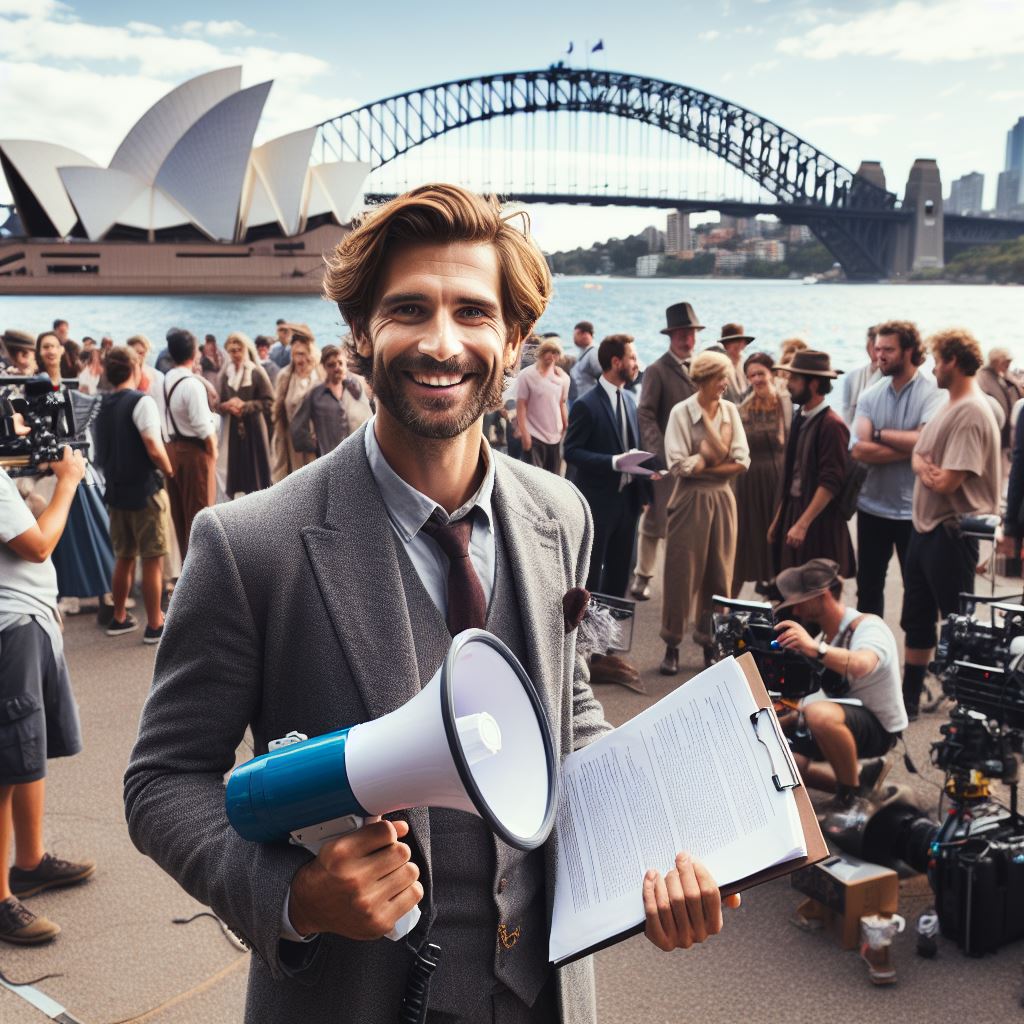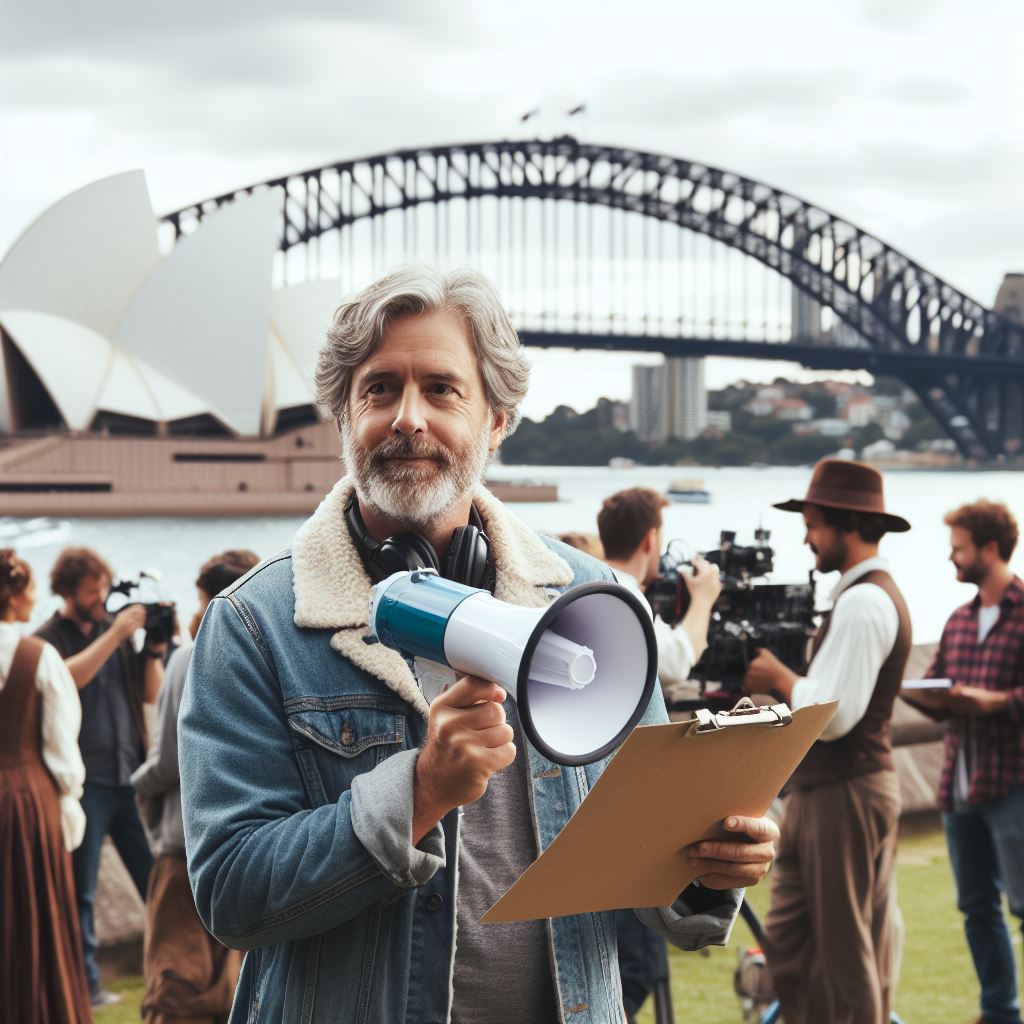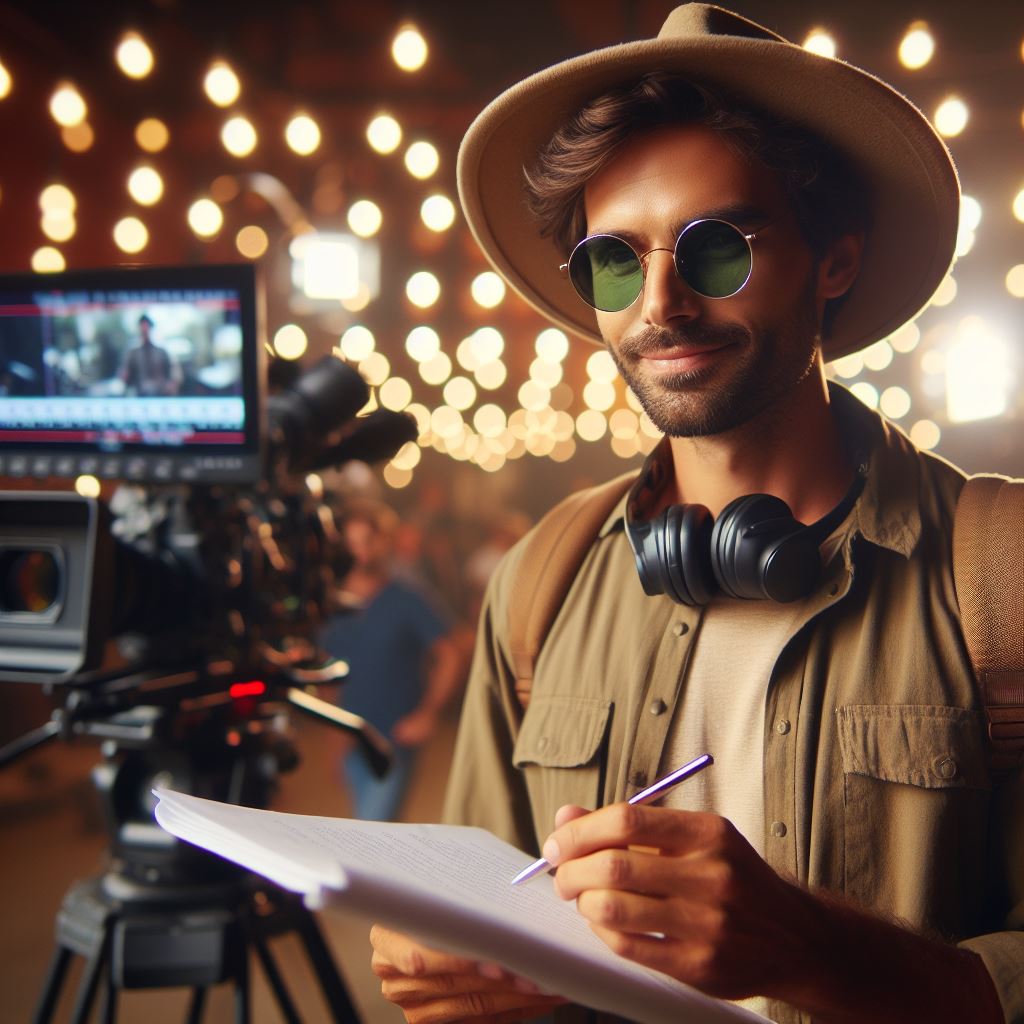Introduction
Reality TV has become a global phenomenon, and Australia is no exception to this trend.
The popularity of reality TV shows has skyrocketed in recent years, impacting the entertainment industry significantly.
In this blog post, we will delve into the world of directing reality TV from an Aussie perspective.
We will explore the unique challenges and opportunities that come with directing these shows in Australia.
Additionally, we will discuss the strategies and techniques employed by Australian directors to create compelling and engaging content.
From casting to storytelling, we will analyze the different aspects involved in the process of directing reality TV.
Furthermore, we will shed light on the impact of reality TV on Australian culture and society.
By examining the popularity and influence of these shows, we can gain a better understanding of their significance in the entertainment landscape.
In summary, this blog post aims to provide a comprehensive overview of directing reality TV in Australia, highlighting the creative and logistical considerations faced by directors in this industry.
So, let’s dive into the fascinating world of reality TV and discover the secrets behind its success Down Under!
Overview of Reality TV in Australia
Reality television has become an integral part of Australian entertainment, capturing the attention of viewers across the nation.
Over the years, the popularity of reality TV shows in Australia has soared, offering a diverse range of genres and captivating storylines that have kept audiences enthralled.
A. The rise of reality TV in Australia
The rise of reality TV in Australia has been a phenomenon in itself. From humble beginnings, this genre has grown exponentially, attracting millions of viewers each year.
The concept of reality TV, where ordinary individuals are placed in extraordinary situations, has struck a chord with Australian audiences, creating a demand for more such shows.
B. Popular reality TV shows in the country
Some of the most popular reality TV shows in Australia have become household names.
“MasterChef Australia,” a cooking competition that showcases the talents of amateur chefs, has captured the hearts of audiences nationwide.
With its nail-biting challenges and expert judges, this show has garnered a massive following and has even produced successful culinary stars.
Another immensely popular reality TV show is “The Block,” a renovation competition where couples compete to transform dilapidated properties into stunning homes.
This show not only showcases the creative prowess of its contestants but also offers valuable insights into the world of interior design and home renovation.
The Block has managed to maintain its popularity over the years due to its engaging storytelling and relatable contestants.
Australia’s reality TV landscape is not limited to cooking and renovation shows.
Shows like “Survivor Australia” transport contestants to remote locations, challenging them physically, mentally, and emotionally.
This adventure-based reality TV show tests the limits of its participants and provides viewers with a thrilling viewing experience.
C. The diversity of reality TV genres in Australia
Diversity is a key feature of reality TV genres in Australia.
There is something for everyone, catering to a wide range of interests and preferences.
From dating shows like “The Bachelor Australia” to talent competitions like “The Voice Australia,” there is a reality TV show that appeals to every viewer.
Reality TV has managed to elevate the entertainment industry, providing a platform for aspiring singers, chefs, dancers, and even love-seekers to showcase their talent or find their soulmate.
These shows have become major cultural phenomena, creating household names out of ordinary individuals.
One of the reasons reality TV has gained such popularity in Australia is its interactive nature.
Viewers are not mere spectators; they can actively participate by voting, sharing their opinions, and even being an integral part of the show through auditions or call-ins.
Moreover, reality TV shows often spark conversations and debates, making them a common topic of discussion among friends, families, and coworkers.
They have become a shared experience, fostering a sense of community among viewers.
In essence, reality TV has taken Australia by storm, providing captivating entertainment across various genres.
The rise of reality TV shows in the country has been monumental, attracting millions of viewers and creating a cultural phenomenon.
With its diverse range of shows catering to different interests, reality TV has become an integral part of Australian television and a source of inspiration for aspiring individuals.
Whether it’s cooking, renovating, or surviving in the wilderness, reality TV offers an escape from everyday life and a chance for ordinary Australians to shine.
The Role of a Reality TV Director
A. Primary Responsibilities of a Reality TV Director
- Overseeing and coordinating all aspects of production to create compelling reality TV shows.
- Working with producers to develop the show’s concept and creative vision.
- Collaborating with the production team to create a shooting schedule and budget.
- Directing the cast and crew during filming to capture engaging and authentic moments.
- Maintaining a clear vision for the show and ensuring it is executed successfully.
B. Creative and Logistical Challenges Faced by Reality TV Directors
- Adapting to unpredictable and ever-changing situations on set.
- Navigating tight schedules, multiple locations, and limited resources.
- Balancing the need for drama and conflict with ethical considerations.
- Dealing with the pressures of tight deadlines and high ratings expectations.
- Managing the dynamics and emotions of the cast and crew.
C. The Importance of Storytelling and Character Development in Reality TV
- Creating compelling storylines and narratives to captivate the audience.
- Showcasing relatable and engaging characters to draw viewers in.
- Developing strong character arcs that allow for growth and transformation.
- Building tension, suspense, and emotional connections through editing and storytelling techniques.
- Crafting narratives that resonate with the target demographic and keep them coming back for more.
A reality TV director guides the entire production, ensuring smooth operations aligned with the creative vision.
Their primary goal is crafting compelling content to retain and engage audiences consistently.
Challenges include adapting to unpredictable situations, thinking on their feet, making quick decisions, and capturing authentic, unexpected moments.
Logistically, directors navigate tight schedules, manage multiple locations, and optimize limited resources. Juggling these elements ensures the show maintains its intended vision.
Ethical considerations play a significant role. Directors balance the need for drama with participant well-being and privacy, fostering growth while ensuring high entertainment value.
At the core is storytelling. Directors create captivating storylines, showcasing relatable characters with compelling arcs to emotionally connect viewers to the show.
Editing and storytelling techniques are vital tools. Directors collaborate with editors to build tension, suspense, and emotional connections through carefully selected and presented footage.
In review, reality TV directors shoulder significant responsibilities, facing creative and logistical challenges. Their role is essential in captivating audiences globally, prioritizing storytelling, and fostering character development.
Read: Essentials of TV Directing in Australia
The Qualities and Skills of a Successful Reality TV Director
In the high-stakes world of reality TV, an Aussie director’s prowess extends beyond kangaroos and koalas.
Your Personalized Career Strategy
Unlock your potential with tailored career consulting. Get clear, actionable steps designed for your success. Start now!
Get StartedSuccess demands a unique blend of qualities and skills.
A. Essential Qualities for Directing Reality TV
- Visionary Perspective: A successful director possesses a keen eye for captivating storylines that resonate with diverse audiences.
- Emotional Intelligence: Understanding contestants’ emotions ensures genuine narratives, fostering viewer connection and engagement.
- Creativity and Innovation: Adept at crafting fresh and unexpected twists, a director keeps the show dynamic and unpredictable.
B. Importance of Communication and Leadership Skills
- Clear Articulation: Effective communication with contestants and the production team ensures a seamless execution of the director’s vision.
- Team Building: Building a cohesive and motivated production team is paramount for a smooth and efficient reality TV shoot.
- Conflict Resolution: The ability to mediate conflicts diplomatically ensures the show’s drama stays on-screen, not behind the scenes.
C. Adaptability and Quick Decision-Making in Fast-Paced Environments
- Adaptability: Unpredictable challenges demand a director who can adapt swiftly to changing circumstances without compromising quality.
- Decisiveness: In the fast-paced realm of reality TV, split-second decisions are often the difference between success and failure.
- Resourcefulness: Making the most of limited resources ensures a director can deliver a high-quality product even under tight constraints.
In the relentless world of reality TV, the Aussie perspective adds a unique flavor, blending creativity, resilience, and a touch of laid-back charm.
The successful director Down Under is not just a captain; they are the ringleader of a thrilling and unpredictable circus, orchestrating a spectacle that keeps viewers on the edge of their seats.
Aspiring directors, take note – the Aussie way is not just about surviving; it’s about thriving in the chaos of reality TV.
Read: Cultural Diversity in Aussie Media

Pre-Production Process
A. The importance of pre-production in reality TV directing
In the world of reality TV directing, the pre-production phase plays a crucial role in ensuring the success of a show.
First and foremost, pre-production allows the director to set the foundation for the entire production.
It is during this phase that the concept, tone, and style of the show are established.
B. Tasks such as casting, location scouting, and creating show formats
Casting is a key task in pre-production as it determines the success and appeal of the show.
The director works closely with casting agents to find individuals who will bring unique personalities and engaging storylines to the screen.
Location scouting is another vital part of pre-production. The director and location scouts work hand in hand to find suitable settings that align with the show’s concept.
This process involves visiting multiple locations, assessing their practicality, and determining their visual appeal.
Creating show formats is an essential aspect of pre-production. The director collaborates with writers and producers to develop a structure that will captivate and entertain the audience.
This includes deciding on the overall arc of the show, the number of episodes, and the challenges or competitions that will take place.
C. The collaborative nature of pre-production and the involvement of other production team members
Pre-production is not a solo effort but rather a collaborative endeavor.
The director works closely with other production team members to ensure that every aspect of the show is organized and aligned.
The art department, for example, collaborates with the director to create sets and props that complement the show’s aesthetic.
The involvement of other production team members during pre-production extends to the technical aspects as well.
Lighting and camera crews work closely with the director to determine the best techniques and equipment needed to achieve the desired visuals.
Additionally, the production manager is an integral part of the pre-production process.
They handle logistics, budgeting, and scheduling, making sure that everything runs smoothly before the cameras start rolling.
During pre-production, rehearsals and table reads also take place.
This allows the director to work with the cast and crew, fine-tuning performances and ensuring that everyone is on the same page creatively.
The importance of pre-production cannot be overstated.
It is the phase that lays the groundwork for a successful reality TV show.
It sets the tone, establishes the format, and brings together a team of talented individuals who will work towards a common goal.
In short, pre-production in reality TV directing is a collaborative and multifaceted process.
From casting and location scouting to creating show formats and involving various production team members, each task is essential.
It is during this phase that the vision for the show comes to life, ensuring that the production runs smoothly and captivates the audience.\
Stand Out with a Resume That Gets Results
Your career is worth more than a generic template. Let us craft a resume and cover letter that showcase your unique strengths and help you secure that dream job.
Get HiredRead: The Future of Directing in Australian Cinema
On-Set Challenges and Responsibilities
A. The challenges directors face during the production phase of reality TV shows
During the production phase of reality TV shows, directors grapple with a myriad of on-set challenges that demand their expertise in managing various elements to ensure a successful outcome.
One of the foremost challenges is the need to orchestrate and synchronize multiple cameras effectively.
This involves coordinating shots, angles, and perspectives to capture the unfolding drama and unexpected moments crucial for the show’s authenticity.
B. The need for managing multiple cameras, directing talent, and maintaining a cohesive storyline
Directors also play a pivotal role in directing talent, a responsibility that extends beyond merely instructing participants on their actions.
They must elicit authentic performances, ensuring that emotions and reactions align with the overarching narrative.
This demands a keen understanding of the show’s dynamics and the ability to guide participants in a way that enhances the overall viewer experience.
Maintaining a cohesive storyline is another significant responsibility that falls squarely on the director’s shoulders.
Crafting a compelling narrative involves more than just capturing raw footage; it requires a strategic approach to storytelling.
Directors must make critical decisions in real-time, determining which moments to emphasize, which angles to focus on, and how to piece together the footage coherently to engage the audience.
C. The director’s role in maintaining the show’s vision and managing unexpected situations
Crucially, the director’s role extends beyond managing the technical aspects of production.
They are the custodians of the show’s vision, responsible for ensuring that every frame aligns with the creative objectives set forth by the producers.
This involves constant communication and collaboration with the production team to uphold the intended essence of the show.
In the unpredictable realm of reality TV, directors must be prepared to navigate unexpected situations seamlessly.
Whether it’s handling interpersonal conflicts among participants or adapting to spontaneous developments, their ability to think on their feet and make quick, informed decisions is paramount.
This agility is essential to maintain the flow of production while safeguarding the integrity of the show.
In a nutshell, the challenges and responsibilities faced by directors during the on-set production of reality TV shows encompass a multifaceted role.
From managing technical aspects like multiple cameras and directing talent to preserving the show’s vision and handling unforeseen circumstances, directors are instrumental in shaping the success of reality TV productions.
Read: Freelance Journalism in Australia
Post-Production and Editing
A. The importance of post-production in reality TV directing
Post-production stands as a crucial phase in reality TV directing, wielding immense significance in shaping the final product that audiences ultimately experience.
This phase involves a meticulous process of assembling, refining, and enhancing the raw footage captured during production, transforming it into a polished and compelling narrative.
B. The role of the director in guiding the editing process
The director’s role extends seamlessly into post-production, where they guide the editing process.
Transform Your LinkedIn for Maximum Impact
Elevate your professional brand with a LinkedIn profile that attracts recruiters, showcases your expertise, and maximizes opportunities. Stand out in your industry with a profile built for success.
Boost ProfileThis involves collaborating closely with editors to ensure that the footage aligns with the creative vision established earlier.
Directors provide invaluable insights into the nuances of the storyline, character arcs, and the emotional beats that need emphasis, thereby influencing the overall tone and impact of the final product.
One of the primary responsibilities of directors during post-production is to maintain the cohesive and engaging nature of the narrative.
They work hand in hand with editors to craft a seamless flow that keeps viewers captivated.
This demands a keen understanding of pacing, timing, and the strategic placement of key moments to sustain audience interest throughout the episode or series.
C. The need for storytelling through editing and creating engaging narratives
The art of storytelling takes center stage during the editing process. Directors leverage their skills to ensure that each cut serves a purpose in advancing the narrative.
This involves not only selecting the most compelling shots but also manipulating the pacing and rhythm to evoke specific emotions and reactions from the audience.
A well-edited reality TV show transforms the raw footage into a captivating story that resonates with viewers on a personal level.
Moreover, directors recognize the power of editing in shaping the perception of reality.
While the essence of reality TV lies in capturing genuine moments, the editing process allows directors to enhance drama, build suspense, and create a more immersive viewing experience.
It involves striking a delicate balance between authenticity and entertainment value, a nuanced skill set that experienced directors bring to the post-production table.
Lastly, post-production and editing are integral aspects of reality TV directing. Directors wield their expertise to guide the editing process, ensuring the final product aligns with the intended creative vision.
Through storytelling techniques and a keen understanding of audience engagement, directors play a pivotal role in transforming raw footage into a compelling and immersive reality TV experience.
Delve into the Subject: Voice Acting in Australia: Getting Started
Success Stories and Recognized Australian Reality TV Directors
When it comes to reality TV, Australian directors have made impressive contributions to the industry.
Their unique perspectives and innovative storytelling techniques have resulted in the creation of many successful shows that have garnered international acclaim.
A. Mark Fennessy
- Mark Fennessy is a renowned Australian reality TV director who has made a significant impact on the industry.
- He is known for his brilliant direction of the hit show “MasterChef Australia,” which has become a global phenomenon.
- Fennessy’s skill in capturing the intense cooking competitions and compelling human stories has led to the show’s immense success.
- For his outstanding work, Fennessy has received numerous awards, including the prestigious Logie Award for Best Reality Program.
B. Jon Olb
- Jon Olb is another accomplished reality TV director from Australia who has left a lasting impact on the industry.
- His most notable contribution is the popular reality show “Survivor Australia,” which has captivated audiences for over two decades.
- Olb’s ability to create thrilling challenges and maintain suspense throughout the series has made it one of Australia’s most-watched programs.
- His work on “Survivor Australia” has been recognized with multiple awards, including the AACTA Award for Best Reality Television Series.
C. Charlotte Wheat
- Charlotte Wheat is a talented Australian reality TV director who has made her mark in the industry.
- She is known for her directing expertise on the show “The Block,” a hit renovation competition series.
- Wheat’s ability to capture the drama and emotions of contestants tackling challenging home renovations has made “The Block” a fan favorite.
- Her exceptional work on the show has earned her recognition, including the AACTA Award for Best Direction in Non-Fiction Television.
D. Julian Cress
- Julian Cress is an acclaimed Australian reality TV director who has made significant contributions to the industry.
- He is the co-creator and director of the highly successful show “The Renovators,” which follows contestants renovating properties.
- Cress’s vision and storytelling skills have made “The Renovators” a ratings hit, captivating audiences with its intense competition.
- He has been recognized for his outstanding work, receiving the AACTA Award for Best Direction in Television for “The Renovators.”
These Australian reality TV directors have not only brought entertainment to millions of viewers but have also received accolades for their exceptional work.
Their artistic vision, storytelling abilities, and dedication to their craft have helped shape the reality TV industry in Australia, making it one of the most successful and revered in the world.
See Related Content: Australian Directors in Hollywood: Insights
Conclusion
This blog section explored the world of reality TV directing from an Australian perspective.
We discussed the important role of directors in shaping the narratives and drama of these shows, as well as their ability to capture authentic and compelling moments.
Reality TV directing holds great significance in Australia, as it has become a popular and influential genre in the entertainment industry.
By understanding the behind-the-scenes aspects of their favorite reality TV shows, viewers can gain a deeper appreciation for the hard work and creativity that goes into creating these programs.
It is worth exploring the techniques and methods used by directors to craft engaging storylines, manage conflicts, and create engaging content.
So next time you settle down to watch your favorite reality TV show, take a moment to think about the director behind the camera, guiding the drama and capturing those intense and emotional moments.
Their influence on the show’s success cannot be underestimated.
In the end, reality TV directing in Australia is a crucial element of the entertainment landscape.
It shapes our viewing experience and offers insights into human behavior and storytelling. It is a fascinating field that deserves more appreciation and recognition.
So go ahead and explore the behind-the-scenes aspects of your favorite reality TV shows and discover the magic that happens off-screen.




